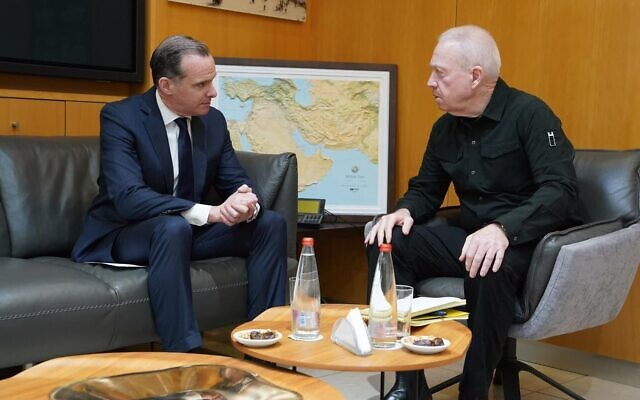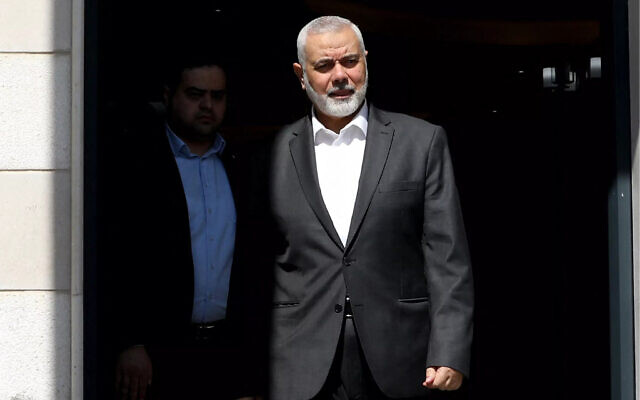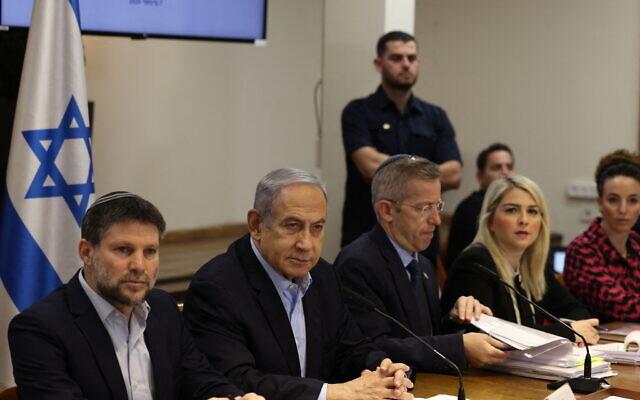



Gaza truce talks were underway in Paris on Friday, in what appeared to be the most serious push in weeks to temporarily halt the fighting in the battered Palestinian enclave and see Israeli and foreign hostages released.
The war cabinet voted unanimously Thursday to dispatch a delegation to the talks, led by Mossad chief David Barnea and Shin Bet chief Ronen Bar, after Israel previously demanded Hamas “soften” its demands in order to achieve progress.
An official from Hamas said the terror group had wrapped up its team’s truce talks in Cairo and was now waiting to see what mediators bring back from the weekend talks with Israel.
The cabinet’s decision to send negotiators to Paris came after a meeting between Prime Minister Benjamin Netanyahu and top White House official Brett McGurk in Jerusalem Thursday, to address the ongoing negotiations, as some media reports indicated Hamas was indeed backing away from certain demands that Netanyahu had deemed “delusional.” Some Israeli officials attributed that development to an impending Israeli offensive in Rafah, Hamas’s last Gaza stronghold.
Israel’s delegation to Paris will confer with CIA Director William Burns, Qatar’s Prime Minister Sheikh Mohammed bin Abdulrahman Al Thani and Egyptian intelligence chief Abbas Kamel, Reuters reported, citing an unnamed source briefed on the matter. The Egyptians and Qataris serve as mediators between Israel and Hamas, who do not negotiate directly.
A source briefed on the truce talks, who could not be identified by name or nationality, told Reuters Friday that the talks had commenced, with Barnea meeting separately with each party.
“There are budding signs of optimism about being able to move forward toward the start of a serious negotiation,” Reuters quoted the source as saying. Egypt’s Al Qahera TV News also reported that the talks had begun.
Hebrew media reports also cited cautious optimism by Israeli officials, though they stressed that a deal was not imminent.
“There is optimism, but we are only at the initial stage,” Channel 12 quoted an unnamed senior Israeli source saying. “The effort is to create a basic framework with clear criteria regarding what we are discussing and what we are not. There is still no deal close at hand. The goal is to deliver one before the start of the month of Ramadan.”
It also quoted an Israeli security source saying that Israel “will step up the military pressure until the last moment, because only negotiations amid fire will bring results.”
Defense Minister Yoav Gallant, with whom McGurk also met, has said the country’s hostage negotiators were being given expanded authority.
Channel 13 reported Friday evening that this time the Israeli team was given leeway with respect to humanitarian assistance and other matters that it was barred by the military censor from specifying. Channel 12 reported that the delegation had been empowered to ease its stance a little regarding the ratio of Palestinian security prisoners to be released in exchange for each hostage, after Hamas also eased its stance. There could also be Israeli flexibility on the length of a truce during which the deal would be implemented, and on matters relating to the post-war rehabilitation of Gaza and the return of northern Gazans to their homes.
There is no flexibility, Channel 12 stressed, regarding Israel’s rejection of the Hamas demand for a permanent ceasefire and the end of the war — a demand that Hamas continues to insist upon as a condition for a new hostage deal.
Diplomatic efforts have taken on fresh urgency ahead of the Islamic holy month of Ramadan, which begins on March 10 and is regularly a time of increased tensions between Israelis and Palestinians, particularly surrounding holy sites including Jerusalem’s Temple Mount. Egypt has been anxious to forestall a possible Israeli offensive in Rafah, which the country fears would push hundreds of thousands of Palestinian refugees into its territory.
Washington’s National Security Council spokesman John Kirby told journalists that so far the discussions were “going well,” while war cabinet minister Benny Gantz spoke Wednesday of “the first signs that indicate the possibility of progress.”
Barnea and Burns helped broker a week-long truce in November that saw the release of 105 hostages and 240 Palestinian prisoners held in Israeli jails. Terrorists in Gaza still hold 136 people in captivity, not all of them alive.
Mediators have been trying for months to broker another pause in fighting and hostage release deal. Talks have been stuck since Prime Minister Benjamin Netanyahu rejected what he said were “delusional” demands from Hamas seeking the release of thousands of Palestinian security prisoners, including hundreds serving life sentences, an end to the war, and the withdrawal of all Israeli troops from Gaza.
Nonetheless, Hamas’s political leader, Ismail Haniyeh, arrived in Egypt Tuesday, in the strongest sign in weeks that negotiations remained alive. At first, Israel did not partake in the latest Cairo round, eliciting outrage from hostages’ families.
A day later, the Saudi Asharq Al-Awsat newspaper reported that an Israeli delegation had arrived in Cairo after Hamas had “softened its positions.”
In that vein, Channel 12 reported Friday that Hamas had drastically lowered the number of prisoners it would demand Israel to release in return for the hostages. According to Channel 12, Hamas is now demanding the release of several dozen, and perhaps fewer, Palestinian prisoners in return for each Israeli hostage — down from hundreds.
Other Hamas demands remained the same, according to the report, and included a roughly four-and-a-half month truce, as well as a staggered release of Israeli hostages, where “humanitarian cases” would be released first and abducted soldiers last.
Speaking to Channel 12 Friday, Culture Minister Micky Zohar said that the change in Hamas’s position was the result of Israel’s military pressure, and particularly the threat that Israel’s military would push into the Gaza Strip’s southernmost city of Rafah, where over a million displaced people from the enclave’s north and center have found shelter from the Israeli offensive.
However, Hamas was still insisting on a full withdrawal of Israeli forces from the Gaza Strip, Ynet reported Friday, citing Palestinian sources.
Israel, meanwhile, seeks open-ended control over security affairs in Gaza, relegating control of civilian affairs to “local officials,” according to a long-awaited postwar plan Netanyahu presented to the security cabinet Thursday for approval.
Netanyahu’s plan drew swift rebukes from Palestinian officials, who were quoted by The Associated Press Friday as calling it “colonialist and racist.”
Speaking to reporters about Netanyahu’s plan in Buenos Aires Friday, US Secretary of State Antony Blinken also reiterated his country’s position that there “should be no Israeli reoccupation of Gaza” and that “the size of Gaza’s territory should not be reduced.”
War broke out on October 7, when thousands of Hamas-led terrorists stormed southern Israel to kill nearly 1,200 people, mostly civilians, and take over 250 hostages of all ages, while committing numerous atrocities and weaponizing sexual violence on a mass scale.
Vowing to uproot the Palestinian terror group, Israel launched an unprecedented offensive in the coastal enclave, destroying about half of its residences and displacing over a million people, many of whom face the risk of starvation.
According to the Strip’s Hamas-controlled health ministry, nearly 30,000 Palestinians have been killed in the hostilities. The figure, which cannot be independently verified, does not distinguish between civilians and combatants, of whom Hamas says it has lost about 6,000, while the Israeli military claims to have killed 12,000.




